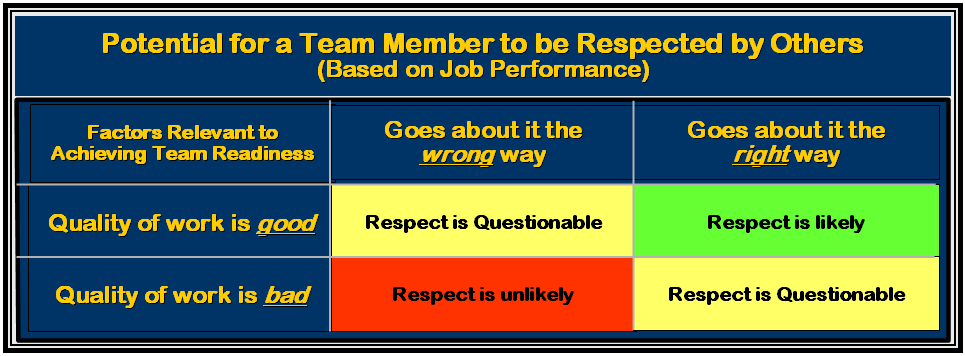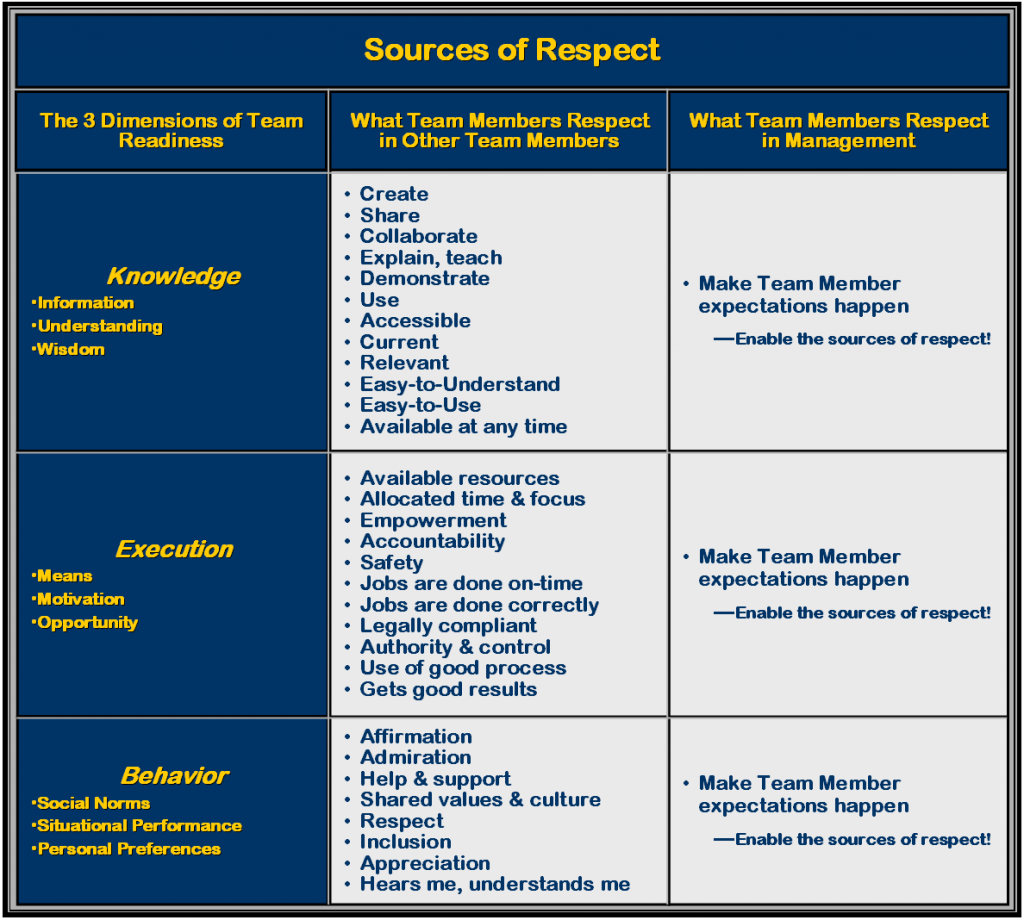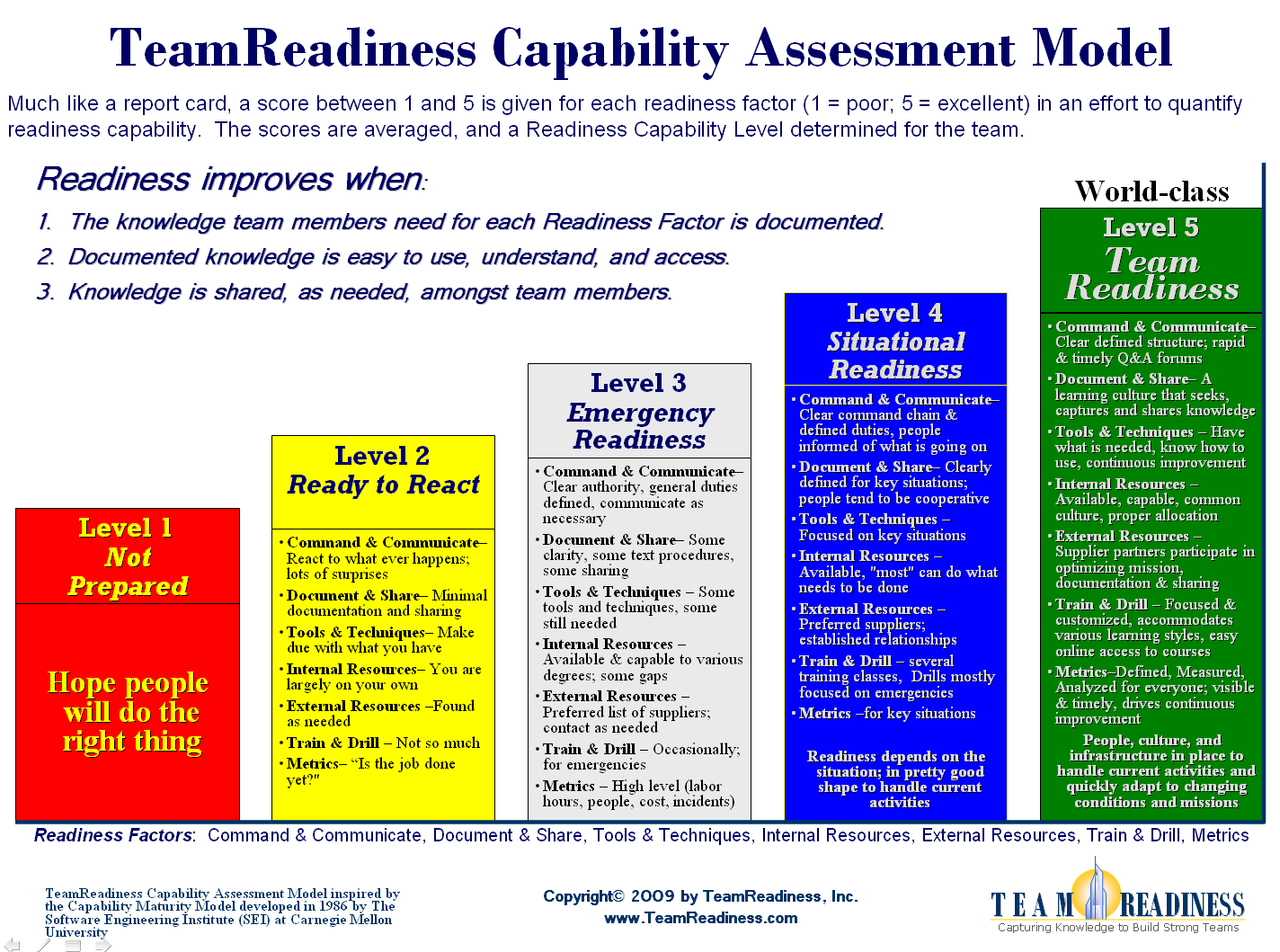The Role of Respect in Achieving Team Readiness
Respect is the positive feelings and associated actions you show someone or something that you value or hold in high regard. We all want respect. We want to be valued for who we are and the contribution we make. We want to be listened to, understood, sought out, recognized, treated with deference, admired, included in activities, and given our proper reward. Similarly, none of us want to be disrespected where we are unwanted, ignored, or treated poorly.
Respect is an important factor in a team’s ability to achieve readiness. A team achieves readiness when each individual member can do their job, on time, safely, according to specification, within budget, and as expected. Its about getting a job done in the proper way and getting the proper results. To achieve team readiness, team members must have the right knowledge, the ability to execute, and display the appropriate behavior. Individuals must be able to work cooperatively with others to get the job done.
When working with others, as part of a team, what role does respect play? What role does respect play in the teams ability to achieve readiness, in the teams ability to carry out its mission successfully? Can a team member who is not respected be effective in carrying out his job? Perhaps most importantly, how does a team member obtain the type of respect that facilitates the achievement of team readiness?
TeamReadiness
“What do I have to do to get some respect around here?”
Simply speaking, there are two ways of getting respect as it relates to team readiness: From the quality of the completed work, and from the methods by which the work gets done (e.g., following proper procedures, exhibiting appropriate behavior, etc.). The 2 x 2 matrix (shown below) assesses the potential for respect that people will have for an individual team member based on that individuals’ personal performance.

Potential for being respected by fellow team members
A team member that consistently does a good job and goes about completing the job in the right way, will most likely be respected by his fellow team members. If a team members’ work is done poorly, or the person goes about it in the wrong way, he or she may not be respected. When a team member is not respected, other team members may be less inclined to work cooperatively with him or her. Consequently, the entire team’s performance may be compromised.
Expectations that lead to respect, cooperation, and achievement of team readiness
A person is respected for their capability and effectiveness as demonstrated by the quality of work they do, and/or for the way in which they go about doing it. Each team member has certain expectations for the work quality and the “methodologies” of his or her fellow team members. To the extent that those expectations are met or exceeded, respect will be given. When team members feel respected by their fellow team mates, the potential for cooperation, motivation, and effectiveness increases. If you want to improve team performance, achieve team readiness, then it is necessary that team members feel respected.
What can be done to foster respect withing the team? What can we do to give each team member the capabilities they need to be effective so they can earn the respect of their fellow team members?
Consider the 3 Dimensions of Team Readiness. For team members to be fully prepared to do their jobs, they have to be ready on 3 dimensions – Knowledge, Execution, and Behavior. These 3 dimensions affect how a team will perform and are an integral part of any readiness assessment or improvement activity. To create the potential for respect among team members requires that performance expectation be met in each of these 3 dimensions. The figure below lists the sources of respect and the expectations that team members have of their team mates and management.

Sources of respect expected by team members
What can be done to meet the expectations of team members and enable respect within the team?
Respect is a two way street. It is necessary that organizations create an environment and culture that will foster respect and success. Start by ensuring that team members have the information, resources, and the tools & techniques they need to be successful. Empower team members with knowledge, resources, and behavioral expectations they need to achieve team readiness.
Consider using the TeamReadiness Capability Assessment Model, a self-diagnostic framework to help assess an organizations’ or teams’ ability to optimally carry-out its mission. The model examines seven factors that seem most correlated with readiness capability (based on TeamReadiness implementations and benchmarking).

(Click Image to Enlarge)
TeamReadiness can help your team members achieve the capability and respect they deserve. We make it possible to easily capture and share knowledge for:
- Reference documentation (procedures, checklists, policies, reports, etc.)
- Training materials (courses, tests, certifications)
- Communications (project status, awards, up coming events, policy changes, etc. )
- Collaboration (share ideas & comments, problem solve, continuous improvement, etc.)
Respect is one of the most important qualities that team members seek from their work environment. Do what you can to foster an environment where people can achieve the capabilities and effectiveness they need to feel respected. Only by deliberate and intentional efforts will respect be present and, as a result, a greater ability to achieve team readiness.

TeamReadiness Helps Your Team
Achieve Readiness
Let TeamReadiness help. We can assist with the entire process to quickly and cost effectively help team members grow their capabilities and achieve team readiness!
|
|---|
DMW
Copyright © 2007-2011 TeamReadiness, Inc.




